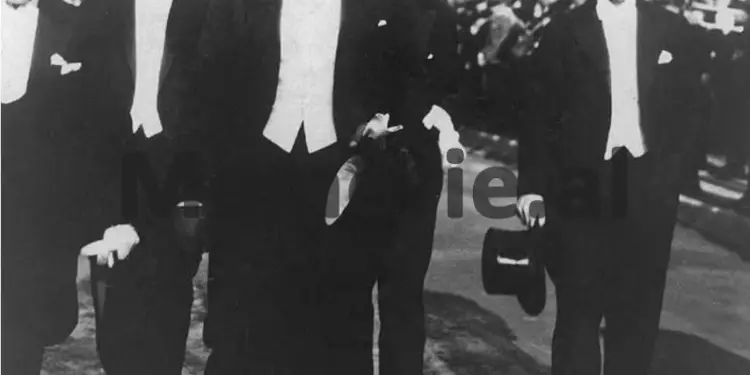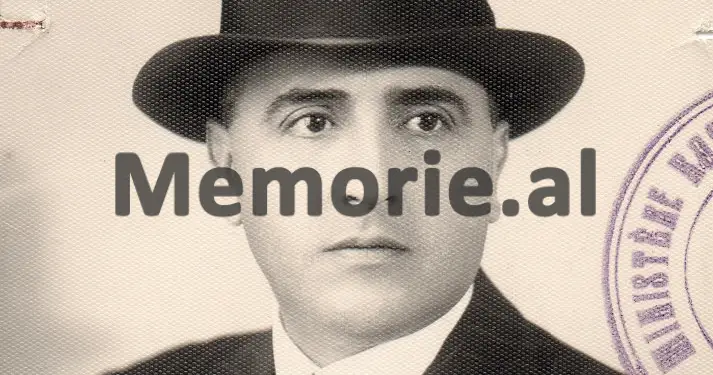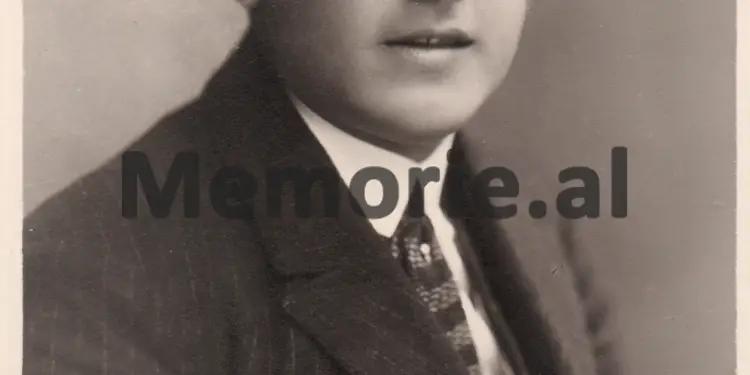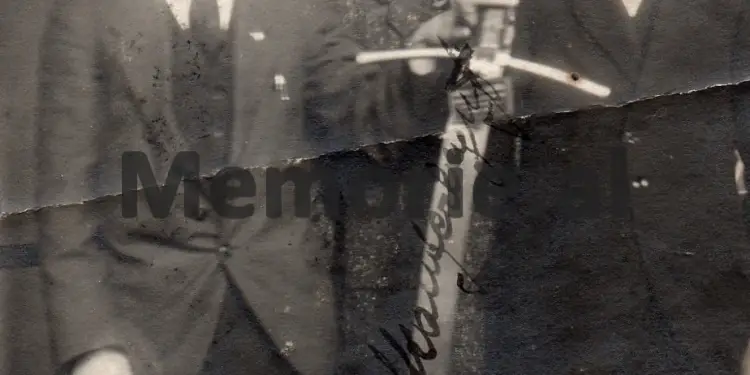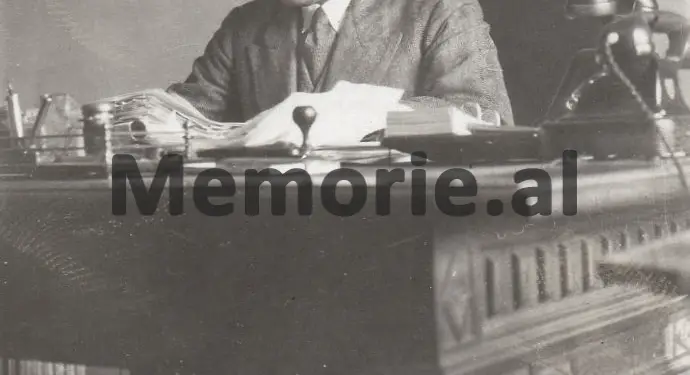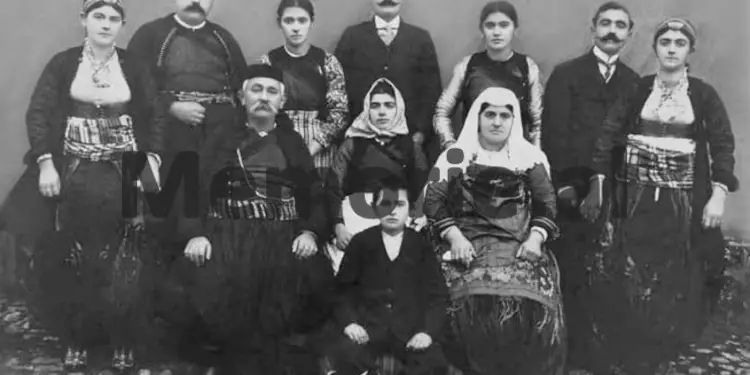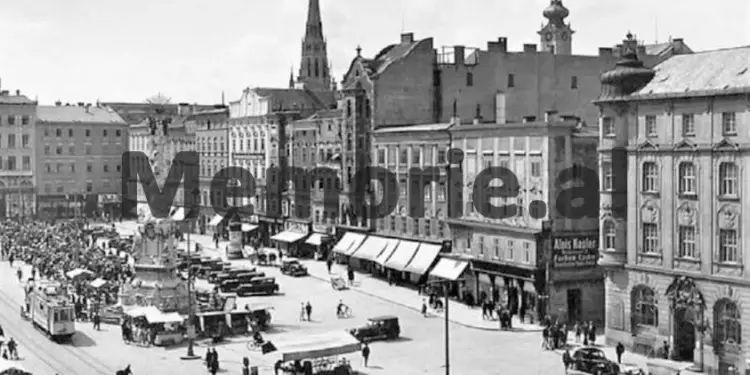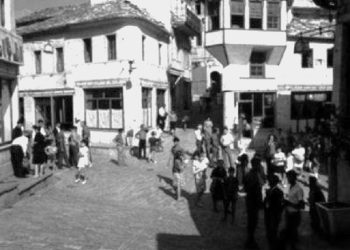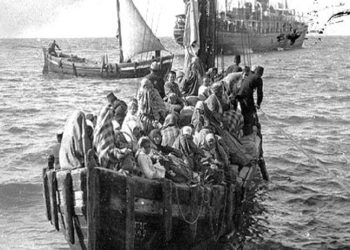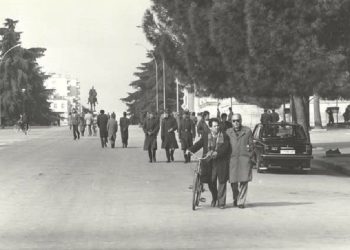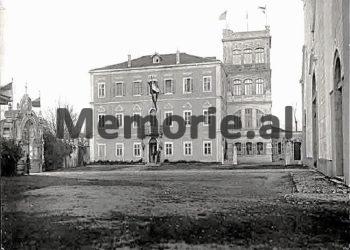By Arben Pustina
Second part
– Rrok Gera, a proper statesman –
FORWARD
Memorie.al/ This book aims to convey to the public the image of a perfect man, who lived in other times, but who was the best example, not only of what an ordinary man can represent, but, next first, as an example of a noble, distinguished, omniscient and, above all, honest statesman. Having in his genes the noble virtues of his origin, being formed as a personality in a wonderful environment, such as Shkodra at the beginning of the 20th century, and graduating from one of the most prestigious universities in Europe, such as that of In Vienna, Rrok Gera had all the potential to be one of the important figures who gave rise to a rapid development through comprehensive reforms in Albania in the 30s of the last century.
This development reached its peak with the government of Mehdi Frashër, considered perhaps the best Albanian government of all time, formed for the most part by non-political persons, among who was Rrok Gera. For 10 years, or more, as a minister or in other high state functions, he worked with conviction that he was walking on the right path for the consolidation of the Albanian state, a process for which he said he had no time to lose. Economist, financier, diplomat, lawyer, Gera was a specialist who advanced towards the top with his professionalism in an environment where the old factions, which were almost dominant in politics and governance, lost ground in front of young and educated people good.
Continues from last issue
RETURN TO ALBANIA AND ACTIVATION IN THE STATE ADMINISTRATION
In the years 1928-1929, Albania reflected the severe economic crisis (the most severe known in the history of the market economy), which had gripped the entire developed world. In addition to the impact of the global crisis, our country also felt the backwardness inherited from the Ottoman occupation and the endless wars that came due to the predatory greed of our neighbors. In 1929, reforms were just starting to take off and, to give direction to the comprehensive development of the country; young, well-educated people with plenty of ideas were needed. But, as we will see later, “young” and “old” would constantly be in a kind of rivalry, where the latter had more advantages.
Therefore, the “young people”, although they represented the best in the professional and intellectual plan, found it difficult to move forward. This explains the fact that Rrok Gera, even though he graduated brilliantly in Austria, waited ten months to be employed, after his return from Vienna. “…I completed my studies with a state scholarship, at the disposal of which I was already in August 1928, here in Tirana, where my brother takes care of me…”, he wrote in his biography dated April 10, 1929 , forwarded to the Prime Minister. But while he waited, he did not sit idly by. Thus, in February 1929, Gera had an exchange of letters with Vlash Dovana, in Durrës, in an effort to establish a commercial bank. In one of the letters addressed to Dovana, Rrok Gera emphasized that one of the branches in which he had graduated at the University of Vienna was banking…!
The days passed and, finally, on May 19, 1929, Gera was offered the position of head of the Financial Section in the Ministry of National Economy and deputy commissioner for anonymous societies. Precisely at this time, he was also appointed as a delegate of the Press Office at the Prime Minister’s Office, to accompany the well-known Austrian writer, Friedrich Walisch, on his trip through Albania. (14 AQS, fund 803, file I-144, year 1929, and sheet 30. A.Q.Sh., Fund 460 (Firma Dovana), file 18, February-March 1929).
Based on the impressions of this trip, Walisch published in Stuttgart, in 1931, the book entitled “Neuland Albanien” (Albania a new country). Wallisch had a special sympathy for our country and it was no coincidence, Rrok Gera, that his first work was titled “Eagles of Skanderbeg”. Although he wrote other works that had Albania or the Balkans as their theme, “Neuland Albanien” remains Wallisch’s most complete work on Albania. In the dedication written in his book, given to Gera, he expressed his gratitude and considered him a close colleague and friend. Similarly, somewhere between the lines of “Neuland Albanien”, the author wrote: “…I am accompanied by Rrok Gera, a ministry official, half Viennese, cultured to the tips of his fingers, who graduated from high school in Linz , high school in Vienna and at a young age has achieved success in state duties”.
In an article of “Gazeta se Re”, dated July 2, 1929, where it was written about a farewell dinner hosted by the Foreign Ministry at the “Continental” Hotel, in Tirana, in honor of the writer Wallisch and his wife, Rrok Gera is also mentioned as secretary of the branch of the Austria Albania Association. At this dinner, Walisch finds the opportunity to thank Gera again for the great care he showed in their journey through Albania. And indeed, in the pages of his book “Neuland Albanien”, the well-known Austrian writer often recounted various “mishaps” of the trip, which were best resolved by the interventions of Gera, whom he described as an ideal companion. In the lines of the book in question, Walisch wrote about him as a man with a lot of humor, and that in the not so safe areas of the trip, he kept his morale high, noting at the same time that people should be stationed there, so that there were no more opportunities for attacks to travelers.
Another time, the Austrian writer told how Rrok Gera burst into a moral sermon against a fraudulent merchant who wanted to trade Mrs. Walisch’s goods, eye to eye, giving her a bag of lesser quality, compared to the one he gave her had shown in the beginning. “…It was necessary, – wrote the author of the book, – for Gera to put all his dignity as a civil servant on the scale, to convince the merchant to take out the bag that was really worth five crowns”. On another occasion, while returning from Shkodra, they had met a group of gypsies who had several bears with them. (Friedrich Walisch: “Neuland Albanian”, Stuttgart 1931, S. 35.). “At the time when the Prime Minister’s photographer and I were photographing them, the gypsies started shouting, asking for money, and it took Gera’s intervention again to calm the situation,” the Austrian wrote.
In another unpleasant situation during the journey, a truck driver had blocked their way and had no intention of moving. “Then,” says Walisch, “our traveling companion, Rrok Gera, aware of his responsibility, begins to speak to the driver, first politely and then energetically, continuing with the heavy artillery: the dignity and titles of Austrian travelers, which begin to sound louder and more magnificently, until they grew to the level of an influential official…”. Gera and Wallisch would maintain friendship for a long time and, coincidentally, passed away around the same time. (Rock on 28.01.1969 and Walisch on 07.02.1969). In addition to Walisch, Rrok Gera’s support for such initiatives was also received by a group of Austrians who had planned an expedition to the Albanian Alps. As true professionals that they were, Dr. Georg Heinsheimer, Dr. Egon Hofmann and prof. dr. Heinrich Schatz, made a preparatory trip before, because they were going to a country they did not know at all.
Based on the valuable recommendations of the well-known geologist Ernst Novak, for the promotion of their initiative they first received the support of the Diplomatic Representation of Albania in Vienna. Then, in the spring of 1930, the Austrians came to Shkodër, where they received a lot of information from the Franciscans (a large part of whom had studied in Tyrol), who knew well the mountain areas of northern Albania, where they had served and that they were promised, among other things, to friends from Austria a guide who knew how to communicate in the German language. Very satisfied with their stay in Shkodër, the Austrians left the “Grand Hotel” and traveled to Tirana. As they wrote in their article entitled “Eine Bergfahrt in das nordalbanische Gebirge 1930” (A climb in the mountains of northern Albania 1930), published in “Zeitschrift des Deutschen und Österreichischen Alpenvereins” (Journal of the German and Austrian Alpine Club), in the capital Albanian, the Austrians found the support of the General Secretary of the Ministry of Finance, Rrok Gera, who saw to it that they received the official recommendations and permits, much needed for their trip to the North.
Also, he made sure that the Austrians did not pay customs for the materials and equipment needed for the Alpine expedition, which was carried out in August 1930. Prof. dr. Heinrich Schatz, assessed in the article in question, that “…the support of Mr. Gera, was very valuable and that the success of the expedition in the Alps was ensured mainly thanks to his precious help”. Rrok Gera was appointed to the post of General Secretary in the Ministry of Finance on June 18, 1930. Like a number of intellectuals educated in Western schools, he was really enthusiastic at that time about the possibility of putting into practice the knowledge and modern concepts that had benefited in Austria. In the fall of 1932, problems were found in the quantities of stamps that came in packages from the “Stamles” Society. The Directorate of the Treasury informed the leaders of the Ministry of Finance about this.
Based on this, Rrok Gera, General Secretary of the Ministry, on September 27, 1932, addressed a letter to the minister, informing him that the quantities of stamps inside the packages sealed by “Stamles” did not match what was marked on packages, so there were differences. According to Gera, “Stamles” was mainly to blame for this, which had not respected the relevant contract. Therefore, Gera forwarded to the minister the proposal for the fine of the company “Stamles”, as well as the removal of the written warning to the personnel of the ministry that had not properly supervised the implementation of the relevant contract. After discussions on this matter, on 24.01.1933, the General Secretary of the Ministry of Finance addressed the Treasury Directorate with the instruction that, in the event that there were shortages of valuables in the packages printed at that time by the “Stamles” company, this company had to be denied the guarantee for non-fulfillment of one of the terms of the contract.
Also, “Eine Bergfahrt in das nordalbanische Gebirge 1930”, “Zeitschrift des Deutschen und Österreichischen Alpenvereins”, Band 62, Jahrgang 1931, Innsbruk, S. 172. (A.Q.SH., fund 178, year 1932, file I-3539, sheet 2). Gera did not exempt from liability the competent officials who had supervised the transport, counting and receiving of the packages. Regarding the issue of stamps, there was also a trial that lasted for about four years in a row (1932-1936), otherwise known as the “Trial of stamps”. It was about a financial scandal, related to monopoly stamps. The trial was held against an official of the ministry in question, who was accused of this scandal.
Rrok Gera also testified in the trial and, in relation to this testimony, in the “Besa” newspaper of October 21, 1933, it was written how the General Secretary of the Ministry of Finance himself testified in the role of a witness that he had just started his duties in the department of of finance, had requested the drafting of an internal regulation for valuables: “…Mr. Gera answers: His lordship (he was referring to one of the accused. – My Saint, A.P.) is the head of the Treasury and as such, he is in charge of, among other things, the management of the treasury and valuables. When I was named General Secretary in June 1930, I wanted to be updated, as for other actions, also on the state of valuables.
When I saw that the situation was not working properly, I asked the organizer’s assistants, Mr. Nodari, to draw up an interior regulation. The regulation supplemented in this way was presented by Mr. Merlino, to his father’s minister, Mr. Kol Thaçi, who brought it to the Controlling Council for approval. The approved regulation, together with the relevant statements, was returned to the Ministry of Finance and in the absence of a topic, it was evaded by the Director of Accounting, Mr. Naraçi, and it was handed over to the Treasury Directorate with a delivery book…”.
When asked why this regulation was not implemented, Gera replied that “…it was impossible, without completing the elements to know the effective state of the valuables…”! Meanwhile, when asked why no disciplinary measure was taken on the delays in the actions, the General Secretary of the Ministry of Finance stated that: “… if there was a need for the directors to be reprimanded immediately in order to they remembered their original tasks, the nationalized apparatus would never work…”. Through Gera’s testimony in this trial, we also learn something about the printing procedures of monopolies stamps and the places where they were produced: “Witness (Rr. Gera – St. im, AP): The sale procedure is as follows: Set, a contract with photographs is made and an official is appointed to supervise the printing actions, for which a minute is kept every day, the approval is done at the Ministry of Finance, where the official of valuables takes delivery, on the basis of a special process.
Printing of stamps is different, in 1924 in Milan, in 1925 in Corfu, in 1927 in Paris. As a member of the Investigative Commission, I found that the last two printing processes are completely missing. Even the stamps printed in Paris during the time of the former minister Mr. Sulejman Starova, when I came to the Ministry, I heard that they were not delivered in the corridors of the Ministry”. In the framework of comprehensive reforms that were undertaken in the early 1930s in Albania, the Ministry of Finance had a large amount of work to do, first of all in the field of preparing new laws. When Rrok Gera was Secretary General in this ministry, many important draft laws were prepared, mainly on tax and customs issues.
An extremely important and truly progressive draft law for the reform of the tax system, to which Rrok Gera contributed, was the draft law whose purpose was to replace the “land production” tax. Despite Gera’s strong efforts of several years, the holders of the Ministry of Finance, in the years 1930-1934, did not consider the approval of such a draft law, even though it was very important. Only after the arrival of Abdurrahman Dibra, at the head of the Ministry of Finance, the draft law managed to be approved by the Parliament in 1935. How much Gera contributed to this draft law can be easily understood through the letter he sent to Prime Minister Mehdi Frashëri on 22.07.1936. , (A.Q.Sh., fund 178, File I-1825, year 1935, sheets 1-6).
As we said, the law “On the replacement of land with tax deducted in cash”, was approved in the parliament and then decreed, being considered by all, as it was also emphasized in the publication “Albania in 1937”, a step great reformer: “…this great reforming step is characterized by the fiscal sacrifice that the state itself undertook with full knowledge and desire, with this only for the sake of eradicating an oppressive and unbearable state of affairs, which further burdens on the peasant farmer from the annoyances of the greedy farmer, whom the very provisions of the anachronistic law protected and encouraged in his abuses, to the detriment of the peasant”…! Even today, historians praise the 1935 replacement of the tithing tax as a historic success for economic policies.
Dwelling on this issue, in one of his publications, the well-known historian, Beqir Meta, writes: “…The elimination of the tithe constituted a historical success of the entire economic policy of the Albanian state, it was the most important progressive step in modernization and reform of the tax system. As such, this change would bring positive economic and social consequences. In the first place, he restrained one of the most powerful social antagonisms of the time, between the peasantry and the entrepreneurs of the tenth; it affected the reduction of social tensions that had shaken the country for many decades. Second eye, with the change of the tithe, one of the most cancerous wounds of agriculture, which was atrophying it, was uprooted. The effectiveness of this change was felt in the years that followed.”
Rrok Gera did not hesitate to put his professional views and ideas on paper and publish them in various magazines and newspapers. He had written about his ideas on financial and economic issues since 1927 (Magazine “Djaleria”) and then in 1929 (Newspaper “Bota e Re”), before entering work. Thus, in the first months of 1929, on the pages of “Gazeta e Re”, Gera published several articles of an economic and financial nature, which showed, among other things, that he was very up-to-date with such topics as the budget financial 1929-1930. We remind you that we are talking about articles written at a time when he had not yet started work.
In the article “Buzheti i Ri”, Rrok Gera emphasized that … “The most important question: does everyone pay their taxes according to the amount they have, deserves special intensive studies”… and at the same time concluded that: “That’s why in the interest of the general prosperity of Albania, both now and in the future, as well as necessary from the point of view of justice, to study new ways and means, in order to contribute to all citizens (according to their condition) for the state treasury…”. While in the article titled: “Changes in the Customs Tariff”, he noted that the customs tariffs at that time did not have a goods register that was valid not only to find the estimated tax for a commodity, but also an interpretation of the tariff.
“There was a request, therefore, that among the changes that will be made in the customs tariff, the two-pillar system will also be adopted. One contains the general fee, for those countries with which we have no connection; the other to contain the conventional tariff for those countries with which we have tariff relations, which also apply to countries with which we have commercial relations with the most favored nation clause. With these changes, a good service was done to the trade and we had a better understanding of form and order…” In the article: “The development of national agriculture – The importance of credit for the agrarian reform”, Rrok Gera pointed out that it was difficult for the Agrarian Reform to achieve its goal, and it was even impossible to make a fundamental reform, without the organization of an institution of the national agricultural credit….! Memorie.al
The next issue follows





